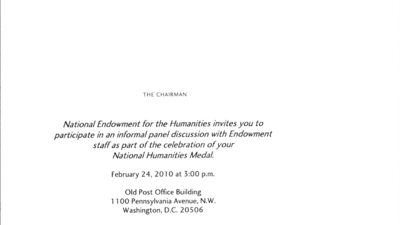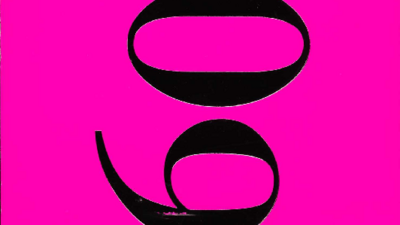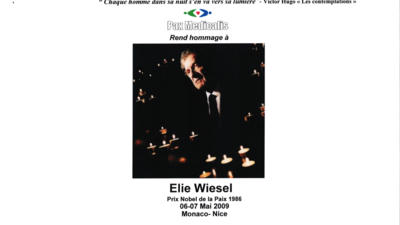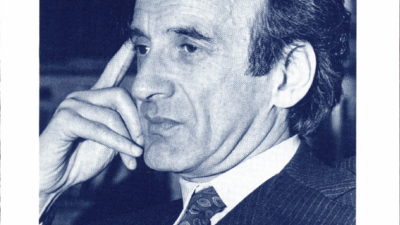Elie Wiesel Tonight on Dialogue with Doti
Title
Date
Contributor
Summary
This document is a promotional flyer announcing a television program titled "Dialogue with Doti." The program features Chapman University President Jim Doti in conversation with Elie Wiesel, a prolific author, Nobel Peace Prize recipient, and renowned Holocaust scholar. The flyer indicates that the program will air "TONIGHT AT 8:30 PM" and directs viewers to "WWW.KCET.ORG/DIALOGUEWITHDOTI" for more information. The bottom of the flyer prominently displays the logos for Chapman University and KCET, the latter celebrating "50 YEARS INSPIRING A BETTER STATE."
More Sources Like This

This document is an invitation from The Chairman of the National Endowment for the Humanities. It extends an invitation to an unspecified recipient, who is an honoree of the National Humanities Medal, to participate in an informal panel discussion with Endowment staff. This event is part of the celebration of the recipient's medal. The discussion is scheduled for February 24, 2010, at 3:00 p.m. at the Old Post Office Building, located at 1100 Pennsylvania Avenue, N.W., Washington, D.C. 20506. Attendees are requested to RSVP to Christopher Flynn via email at cflynn@neh.gov or by phone at 202-606-8440.

This is a formal invitation from Dalia and Larry Leeds for their 60th wedding anniversary celebration. The invitation has a modern design with a hot pink and black color scheme, featuring a stylized number '60' on the front. The event was scheduled to be held on the evening of Tuesday, October 13, 2015, at The Four Seasons Restaurant, located at 99 East 52nd Street in New York City. The specified dress code is Black Tie, and the hosts requested that guests bring no gifts.
of
Ernst L. Presseisen
Ernst Presseisen was born July 13, 1928 in Rotterdam, Netherlands. His father was a businessman. He describes the German invasion of Holland and the bombing of Rotterdam in May1940. He details the gradually tightening restrictions imposed by the Germans to isolate the Dutch-Jewish citizens. After roundups of Jewish men started in July 1942, his father - helped by Christian friends who had contact with the underground - planned the family’s escape. His mother’s arrest by Dutch police aborted this plan. The entire family, including his mother, was deported to Westerbork in August 1942 and stayed there until February 1944. He describes life in Westerbork in detail, including his own development of survival skills and how his family managed to remain there instead of being deported to Poland. He briefly mentions Geneker, the commander of Westerbork.
In February 1944 he was deported to Bergen-Belsen with his family. He describes his experiences there in detail, including slave labor assignments and general deterioration of the inmates’ health. Jewish prisoners organized a theatre group “Cabaret Westerbork” in that camp. In the fall of 1944 Ernst got typhus and his oldest brother died of it. He mentions Greek Kapos. At the approach of the British Army, the Germans decided to evacuate the camp in April, 1945. Prisoners who survived the evacuation were liberated by the Russians and ordered to requisition housing in Trebitsch, Germany. Ernst briefly describes survival in Trebitsch. After his parents died of typhus, he was repatriated to the Netherlands by the Red Cross in June 1945. He talks about life in post-war Holland. He emigratedto the United States in October 1946. He settled in California with relatives and taught German history at the university level after getting his degree.
Interviewee: Ernst Leopold Presseisen Date: April 22, 1983
of
Bertram Kornfeld
Bertram Kornfeld, born in Vienna, Austria in 1925, immigrated to the United States in
1938. In February 1944, he joined the U.S. Army and served in the 423rd Battalion of the 106th Infantry Division. During the Battle of the Bulge, he and his crew were captured by German soldiers in Belgium, near Malmedy. They were forced to march with many other prisoners for several days to a railroad, where they were crowded into cattle cars. When the train reached Koblenz, the locked cars were left overnight in a railroad yard where RAF bombers narrowly missed them. They arrived at Stalag 4-B, located between Leipzig and Dresden, in December 1944.
Mr. Kornfeld describes the bitter cold, the callous disregard of sick and dying prisoners during the transport, lack of food and water for two weeks and a limited prison diet thereafter. At his liberation in April 1945, he had lost 50 pounds. Despite his deprivation, he claims that the Germans observed the Geneva Convention in regard to American and British prisoners, but brutally mistreated the Russians. He depicts the Russian liberators of his camp as drunken Cossacks who slaughtered the remaining Germans, but befriended the prisoners by baking bread for them.
When Mr. Kornfeld and some friends fled and met American soldiers in Leipzig, they were given rich food, which sickened them and required a brief hospitalization. He returned to the
United States and was discharged in December 1945.

This document outlines a two-day event titled "LES LUMIÈRES DE NOTRE TEMPS" (The Lights of Our Time), held on May 6-7, 2009, in Monaco and Nice, dedicated to honoring Elie Wiesel, Nobel Peace Prize laureate of 1986. The event, presented by Pax Medicalis, features a gala dinner under the high patronage of Prince Albert II of Monaco, a tribute to Wiesel's contributions to peace and memory, and presentations by the Elie Wiesel Foundation for Humanity and the University Institute of Jewish Studies-Elie Wiesel. It also includes the awarding of the 'Olivier d'Or-2009 Pax Medicalis' and musical accompaniment by the Monte-Carlo Soloists Orchestra, animated by Paul Amar.
The second day in Nice includes the presentation of the Medal of Honor of the City of Nice in the presence of Christian Estrosi and Eric Ciotti, lectures, the unveiling of a plaque in Wiesel's name at the House of Judaism of the French Riviera, and a film screening about Elie Wiesel titled "Empreintes avec Elie Wiesel : « Messager de la Mémoire »". The document also lists numerous contributing organizations and partners, highlighting the focus on peace, humanity, and the legacy of Elie Wiesel.

This document is a multi-page invitation and program for a dinner hosted by The National Committee on American Foreign Policy, held on May 7, 1987, at the St. Regis Roof in New York. The event honored Elie Wiesel, the 1986 Nobel Peace Prize Laureate. The document includes a biography of Elie Wiesel, detailing his early life in Romania, education at the Sorbonne, immigration to the United States, and his distinguished career as an author and professor, notably his writings on the Holocaust and his advocacy for human rights. It also lists the individuals and the organization inviting guests to the dinner, as well as the committee's leadership and founding information, established in 1974 to stimulate interest in American foreign policy.